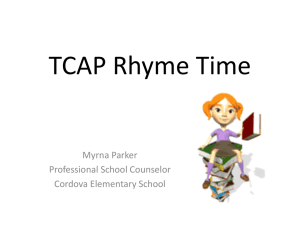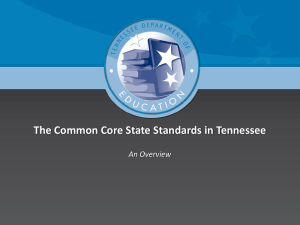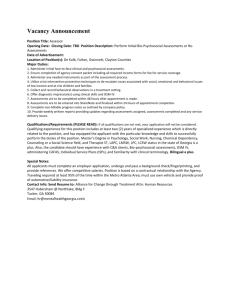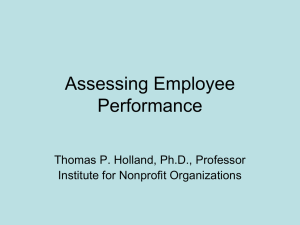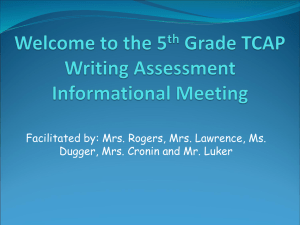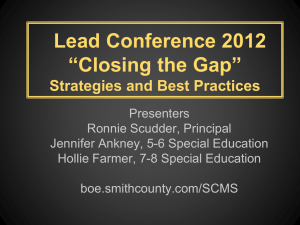Ethical-Unethical Assessment Practices
advertisement
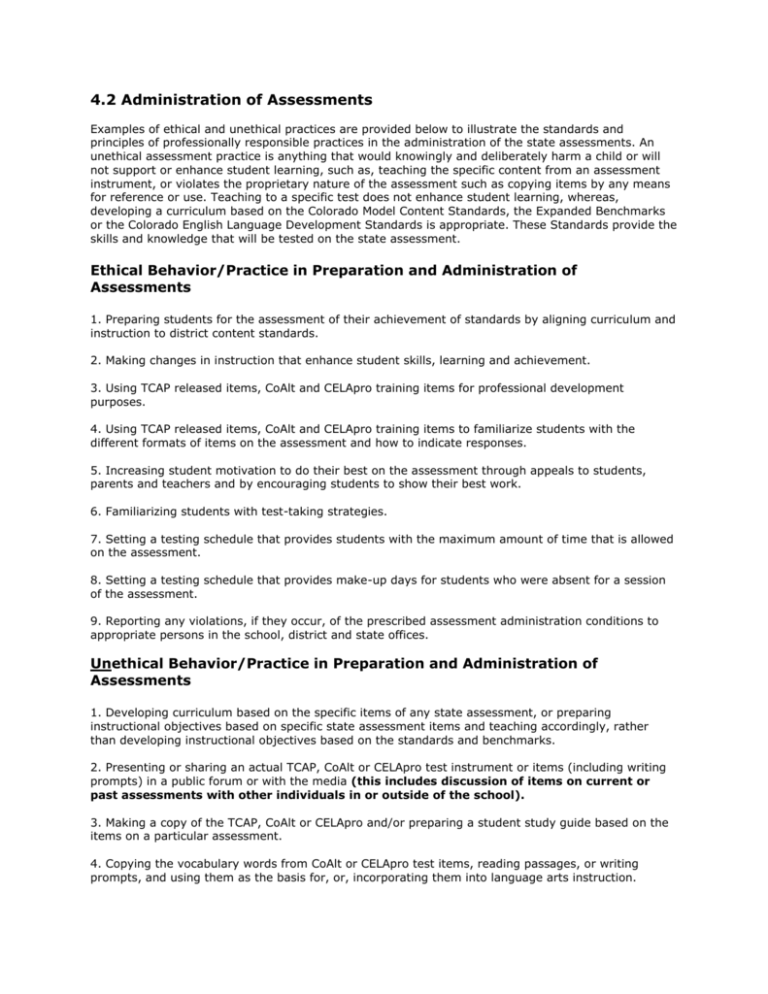
4.2 Administration of Assessments Examples of ethical and unethical practices are provided below to illustrate the standards and principles of professionally responsible practices in the administration of the state assessments. An unethical assessment practice is anything that would knowingly and deliberately harm a child or will not support or enhance student learning, such as, teaching the specific content from an assessment instrument, or violates the proprietary nature of the assessment such as copying items by any means for reference or use. Teaching to a specific test does not enhance student learning, whereas, developing a curriculum based on the Colorado Model Content Standards, the Expanded Benchmarks or the Colorado English Language Development Standards is appropriate. These Standards provide the skills and knowledge that will be tested on the state assessment. Ethical Behavior/Practice in Preparation and Administration of Assessments 1. Preparing students for the assessment of their achievement of standards by aligning curriculum and instruction to district content standards. 2. Making changes in instruction that enhance student skills, learning and achievement. 3. Using TCAP released items, CoAlt and CELApro training items for professional development purposes. 4. Using TCAP released items, CoAlt and CELApro training items to familiarize students with the different formats of items on the assessment and how to indicate responses. 5. Increasing student motivation to do their best on the assessment through appeals to students, parents and teachers and by encouraging students to show their best work. 6. Familiarizing students with test-taking strategies. 7. Setting a testing schedule that provides students with the maximum amount of time that is allowed on the assessment. 8. Setting a testing schedule that provides make-up days for students who were absent for a session of the assessment. 9. Reporting any violations, if they occur, of the prescribed assessment administration conditions to appropriate persons in the school, district and state offices. Unethical Behavior/Practice in Preparation and Administration of Assessments 1. Developing curriculum based on the specific items of any state assessment, or preparing instructional objectives based on specific state assessment items and teaching accordingly, rather than developing instructional objectives based on the standards and benchmarks. 2. Presenting or sharing an actual TCAP, CoAlt or CELApro test instrument or items (including writing prompts) in a public forum or with the media (this includes discussion of items on current or past assessments with other individuals in or outside of the school). 3. Making a copy of the TCAP, CoAlt or CELApro and/or preparing a student study guide based on the items on a particular assessment. 4. Copying the vocabulary words from CoAlt or CELApro test items, reading passages, or writing prompts, and using them as the basis for, or, incorporating them into language arts instruction. 5. Copying test passages, test items, writing prompts, and/or student responses from an actual TCAP, CoAlt or CELApro assessment for any purpose including, but not limited to, their use in instructional planning, classroom instruction or assessment. Please note: Copying includes 31 of this Procedures Manual, as well as the Test Proctor’s Manuals and Test Examiner’s Guides. anymeans of duplicating an item. This may include memorization, text messaging, Morse code, etc. More information is included on page 6. Deviating from the prescribed administration procedures specified in the TCAP Test Proctors Manual or the CoAlt and CELApro Examiner’s Manuals in order to assist student performance. 7. Leaving visible “word walls”, vocabulary posters, spelling words, multiplication tables, or any other aids that could artificially inflate student scores or that are expressly forbidden in assessment administration manuals. 8. Allowing students (who do not have any of these accommodations approved) to use dictionaries, thesauri or word processors with spell and grammar check on the reading and writing assessments. 9. Scribing the essence of the student’s response, rather than scribing exact student responses, including grammatical errors and incorrect responses, when scribing is the accommodation. 10. Telling students the correct responses or allowing them to discuss answers among themselves, or hinting to a student to reconsider an answer to any items he/she has given. 11. Allowing the use of notes or other materials which give students an opportunity to engage in practices which may give them an unfair advantage. 12. Changing responses that students have written or bubbled in. 13. Attempting to score student responses on TCAP or CoAlt before returning the tests to CTB. 14. Purposefully excluding eligible students from TCAP, CoAlt or CELApro by: encouraging lower-performing, special education, or limited English proficient students to stay home during the testing period to artificially boost apparent school performance, sending on field trips or dismissing lower-performing, special education, or limited English proficient students during the testing period to artificially inflate apparent school performance, encouraging students who are not reading at grade level to stay home during the reading portion of the assessments, encouraging parental refusal of assessments to prevent frustration for low-performing students. 15. Not providing students with documented accommodations on the assessment that are normally used during regular assessment situations including district, school and classroom assessments. 16. Providing students with accommodations on the assessment that are not documented in a formal plan and/or are not normally used during regular assessment situations including district, school and classroom assessments. 17. Discussing items or student responses with other staff members or students after the administration of the assessment. Unit of Student Assessment 2011-2012 Procedures Manual © 2012 (May be reproduced) 22, 23, 24
